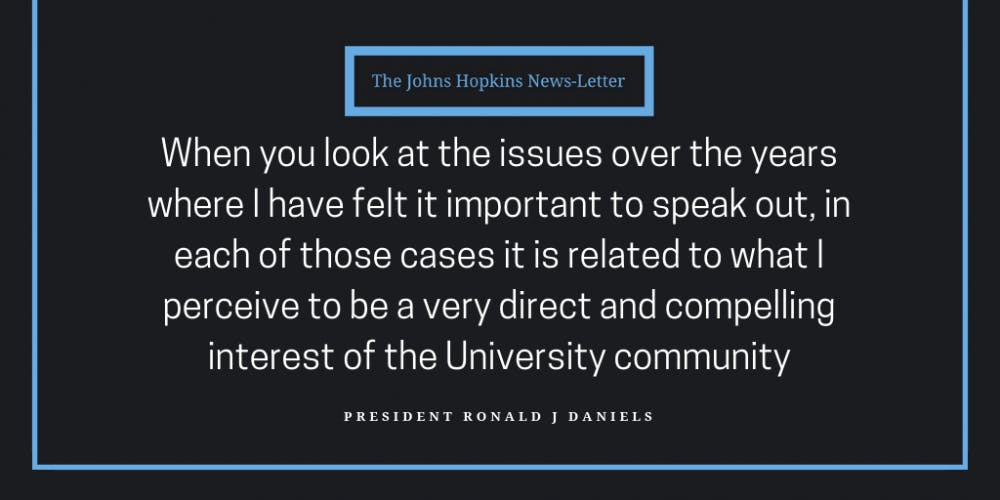In an interview with The News-Letter on Monday, University President Ronald J. Daniels shared his perspective on a variety of issues, including the ongoing discussion about the University’s proposed private police force and resources for low-income students in light of Michael Bloomberg’s $1.8 billion donation. He also discussed graduate students’ concerns about their working conditions, the state of mental health at Hopkins and how he decides when to publicly take a stance on national issues.
A proposed private police force
Following the University’s announcement on Oct. 18 that it would seek community input on its proposed private police force, the University has been hosting panels and open forums throughout the semester. Daniels felt that by starting to seek community input early, the University would be able to create a more robust proposal during the upcoming legislative session.
“What we’re trying to do is get the best possible advice that we can at an early stage. Given where we were last year... there was lots of concern that was expressed in various quarters,” Daniels said. “There was also lots of support expressed for the initiative.”
In response to community members’ reports that their concerns have not been sufficiently addressed, Daniels stated that those left unsatisfied can submit their feedback to the University website. He added that once the new proposal is made available in January, the University will be holding more open sessions to continue gathering community input.
“For people who feel that they have not yet been able to express their views, I can only encourage them to take advantage of the online forum or to participate in the various sessions that we’ve been holding,” Daniels said.
He acknowledged that community members and students who have attended the University’s forums and panels may still be dissatisfied.
“Some people really feel that the discussion is too abstract at this point,” he said. “But that reflects the process, which we started early and invited lots of input, but have said that we’re not going to develop a formal proposal until we have sufficient and broad consultative discussions with community members.”
In response to concerns about the possible increase in armed officers on and around the University campuses, Daniels emphasized that the University would prioritize being highly selective in their recruitment process, train recruits well and ensure that there were frameworks in place to promptly address officer misconduct.
“Should we decide to do as we did last year and make a request of the Maryland General Assembly to confer this responsibility on Hopkins, we’re going to have to put a lot more flesh on the bones around all of those issues,” he said.
Speaking out on national issues
In light of conversations surrounding the University’s stance on Deferred Action for Childhood Arrivals (DACA) and the Immigration and Customs Enforcement (ICE) Agency within the past year, Daniels discussed how he makes decisions on whether to speak out on national issues.
He elaborated on the thought process that goes into his decision, both as an individual and as a university president.
“You always have to be mindful and careful about the times in which you feel that you can adequately represent the vast majority of members of our community,” he said. “You also want to be confident in those positions.”
He cited the example of the JHU-ICE contracts, which the administration refused to terminate on Sept. 21. According to him, though the conversation surrounding the ICE contracts showed a substantial consensus in the Hopkins community, ending the contracts would have posed a threat to academic freedom interests.
For Daniels, deciding when and how often to speak out on national issues is a balancing act. He identified two types of institutions: schools, such as the University of Chicago, that adhere to a strict position of neutrality and other schools with administrations that regularly take stances, even on issues that may not directly relate to them.
“I’m trying to be somewhere in the middle on this. When you look at the issues over the years where I have felt it important to speak out, in each of those cases it is related to what I perceive to be a very direct and compelling interest of the University community,” he said.
Michael Bloomberg’s donation
Michael Bloomberg, the former mayor of New York City and Class of 1964 alumnus, announced on Nov. 18 that he would make a historic $1.8 billion donation to undergraduate financial aid at the University. The University will use Bloomberg’s donation to provide resources for first-generation, low-income (FLI) and middle-income students.
Daniels explained that recruiting FLI students was difficult before the donation because the University had no way to know during the recruitment process whether they would be able to meet a student’s financial need. With Bloomberg’s donation, however, Daniels said that the University will be able to recruit FLI students more confidently, knowing that it has the resources to accommodate them.
“We now have the resources to be able to build serious partnerships and networks that will allow us to identify and recruit FLI students, and we now have the funding to offer the kinds of financial aid packages and overall support that will bring more of those students here,” he said. “It is a game changer.”
Daniels believes that as the population of FLI students increases, the University culture will evolve to allow these students to thrive. Speaking both for himself and the University community, he added that he looks forward to providing an education that will facilitate social mobility.
“Just the sheer numbers of first-generation students are going to have an effect on changing culture,” he said. “There’s a great sense of pride in the University being able to play this vanguard role and being able to change our socioeconomic fabric.”
A possible graduate student union
Graduate students and members of Teachers and Researchers United (TRU) announced their intent to unionize at a rally on Sept. 26. In doing so, they seek the same rights and benefits afforded to other University employees.
According to Daniels, the University continually evaluates how it can work toward improving the graduate student experience. He highlighted improvements made to graduate student stipends, parental leave, career counseling and, most recently, insurance coverage.
He explained, however, that the University has not yet decided if they will support graduate student unionization.
“At this point we haven’t taken a position on that,” he said. “What we are saying is that our responsiveness to PhD [student] concerns and a shared determination on the part of the University and its academic leaders and faculty to ensure the best quality of experience for PhD students is central to us.”
Daniels added that regardless of whether graduate students are unionized or not, the University would work toward improving their experience. In the past, Daniels said that graduate students were able to work with the University without unionizing. He added that the relationship between the University and its PhD students has seen substantial improvement.
“However the graduate students at Hopkins decide to convey their concerns to us, whether with or without a union, for us the quality of the PhD experience and ensuring that our students have the level of support both financially and intellectually to thrive in our program is fundamental,” Daniels said.
Mental health
Past reporting by The News-Letter has shown that many students feel that Hopkins negatively impacts their mental and physical health by creating a toxic environment of stress.
The final report released by the Task Force on Student Mental Health and Well-being on Feb. 22 outlined a series of recommendations to improve the campus climate surrounding mental health and overall student wellness. Daniels emphasized that the University intends to continue working toward implementing these recommendations.
“We’ve done a lot of work on mental health issues with the benefit of student leadership and taken a comprehensive look through the Task Force report. We have implemented several of the recommendations from the report already and are working hard at getting the full array of recommendations implemented in a timely fashion,” he said. “This is not sadly a new issue for us.”
Though he was pleased with recent changes that the Counseling Center has made, including adding drop-in hours and changing the model to reduce wait times and accommodate more students, Daniels encouraged students to also take advantage of other resources offered by the University to promote student wellness. He cited the free fitness classes at the Recreation Center as a way to promote stress management.
Daniels highlighted the Second Commission on Undergraduate Education (CUE2), which is currently working on generating recommendations to improve the overall undergraduate experience at Hopkins.
“If there are things that we can do to attenuate the degree of stress and anxiety that students are experiencing while not compromising the core academic experience, I hope to move in that direction. I’d also like to be able to respond to those ideas that we get from CUE2,” he said.
Katy Wilner contributed reporting.





